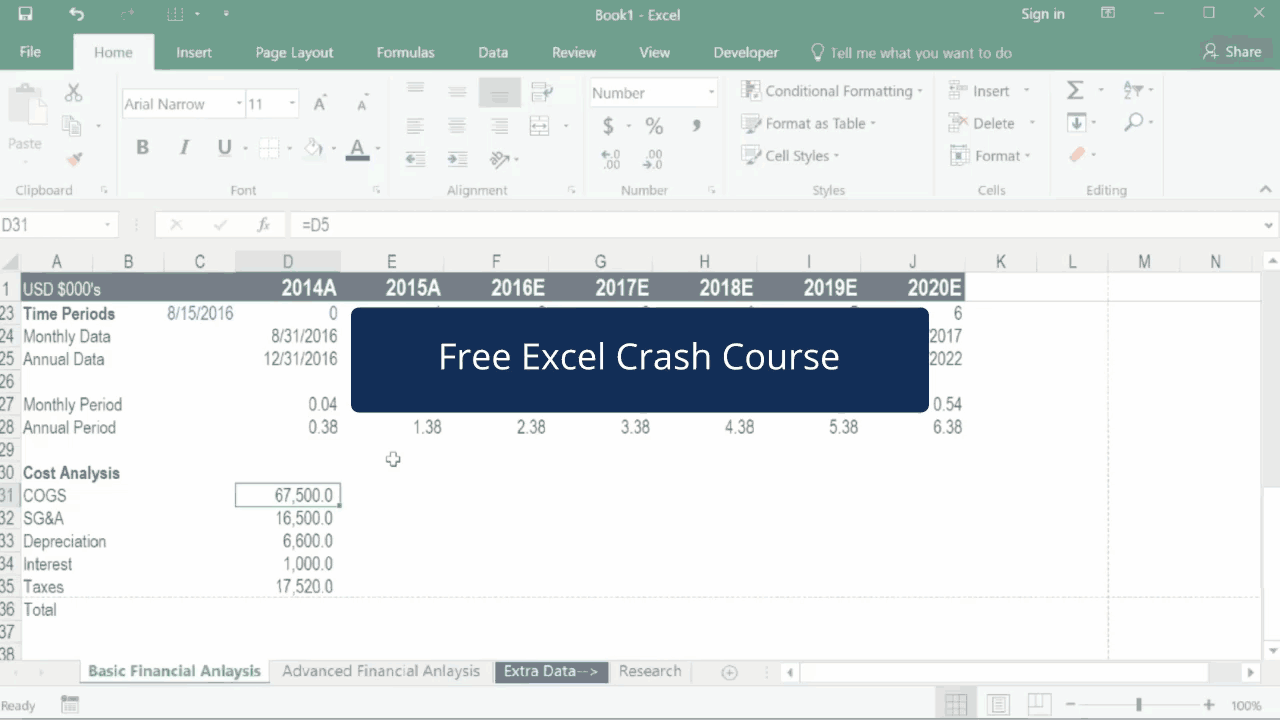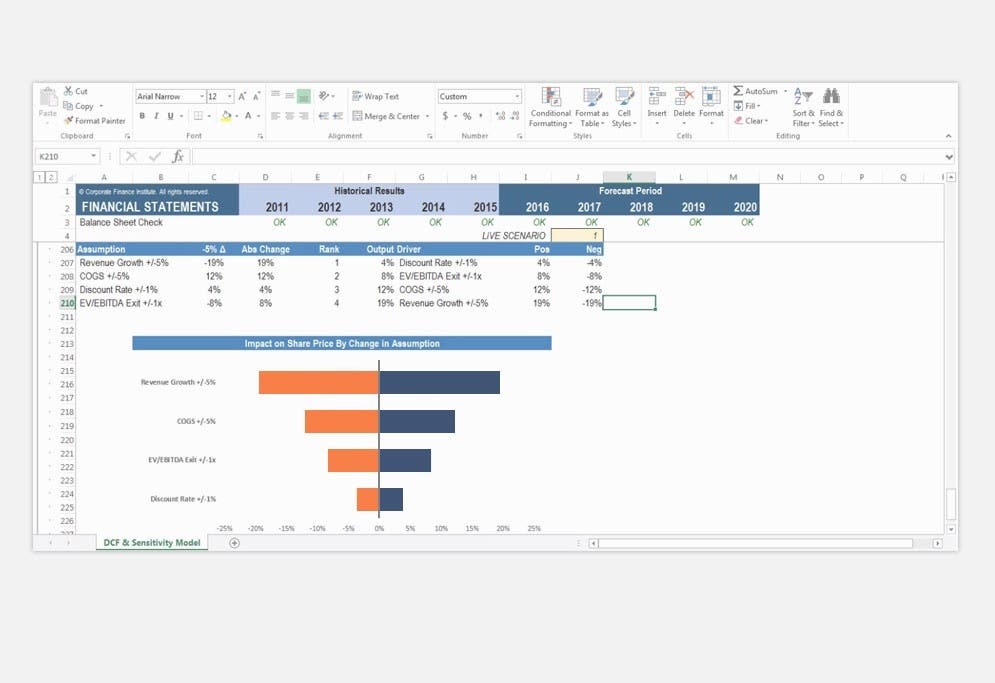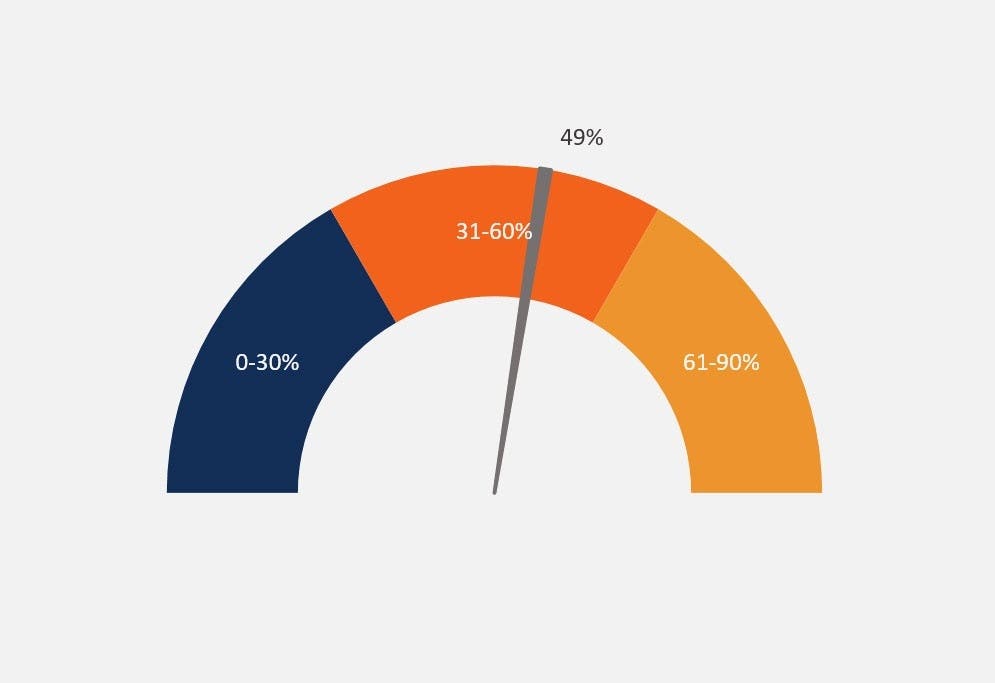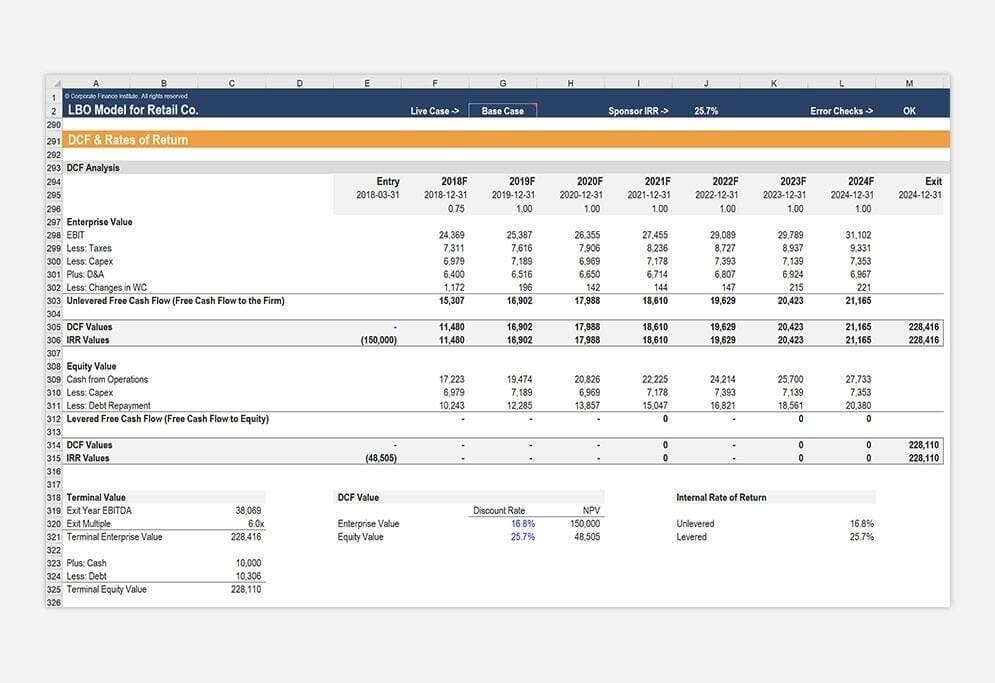- Why Get an Excel Certification as a Finance Professional?
- 1. Gives Competitive Advantage for Better Career Opportunities
- 2. Increases Productivity and Confidence
- 3. Facilitates Professional Development
- 4. Supports Financial Modeling
- 5. Improves Adaptability to Advanced Tools
- 6. Provides Networking Opportunities
- Exploring the Different Types of Excel Certifications for Finance Professionals
- General Excel Proficiency Certifications
- Advanced Excel Certifications
- Financial Modeling and Valuation Certifications
- Data Analysis and Visualization Certifications
- Financial Information Management Certifications
- Popular Excel Certifications for Finance
- 1. Excel Fundamentals - Formulas for Finance: CFI
- 2. Financial Analysis Fundamentals: CFI
- 3. The Excelerator: Miss Excel
- 4. Advanced Excel Formulas and Functions Course: CFI
- 5. Fundamentals of Data Analysis in Excel: CFI
- 6. Excel for Corporate Finance Professionals: LinkedIn
- 7. Excel Fundamentals - Quick Start Guide: CFI
- 8. Surgent’s Critical Skills Certificate: Excel® for Accounting and Finance Professionals
- 9. Everyday Excel Specialization: University of Colorado Boulder
- Choosing the Right Excel Certification for You
Top 9 Excel Certifications for Finance Professionals

Knowing your way around Microsoft Excel can help you stand out in any financial role. But to become an Excel power user, you need to be aware of all the formulas, shortcuts, and charts.
This blog covers the best Excel certifications for financial professionals to build practical skills and gain industry recognition.
Why Get an Excel Certification as a Finance Professional?
As a finance professional, you’re likely swamped with responsibilities. So why put in the effort and time to get certified in Excel? Here are some compelling reasons:
1. Gives Competitive Advantage for Better Career Opportunities
The job market is already competitive. Having an Excel certification sets you apart from other candidates, serving as tangible proof of proficiency in using the software.
Having Excel certifications also assures employers you have the necessary business specialization and skills to navigate, analyze, and manipulate financial data. This makes you more desirable for roles that involve financial analysis, reporting, and modeling. Plus, a strong command of Excel opens doors to more advanced and specialized roles within finance.
2. Increases Productivity and Confidence
Advanced Excel skills can significantly enhance your day-to-day productivity. This is because Excel-certified professionals are often more adept at leveraging the tool’s features and working their way around the keyboard. As a result, finance professionals who are certified in Excel save time and make fewer errors when conducting financial calculations and analyses.
Additionally, knowing you’ve mastered essential Excel skills provides a confidence boost. This may translate into improved performance at work, especially when handling complex financial tasks.
3. Facilitates Professional Development
Continuous learning and professional development are vital in any career. Getting enrolled in an Excel course helps you stay updated with the latest Excel features and functionalities. This, in turn, facilitates ongoing skills improvement. Employers, colleagues, and clients are also more likely to place more trust in your financial analysis and reports once you’ve acquired an Excel certification.
4. Supports Financial Modeling
For any financial professional involved in financial modeling, an Excel certification is particularly valuable. It signifies expertise in building complex financial models, conducting scenario analyses, and making informed, data-driven financial decisions.
5. Improves Adaptability to Advanced Tools
Most Excel certifications not only cover basic functions but also advanced features and tools. Such knowledge and skills in advanced Excel features and tools help financial professionals better adapt to other evolving tools and technologies.
6. Provides Networking Opportunities
When pursuing an Excel certification, you participate in training programs and join communities of certified professionals. This gives you an excellent opportunity to network and connect with other finance students, mentors, employees, and possible future employers.
Exploring the Different Types of Excel Certifications for Finance Professionals
General Excel Proficiency Certifications
- Target Audience: Entry-level finance professionals wanting to use Excel for routine tasks.
General Excel certifications assess your foundational skills in using Microsoft Excel for everyday tasks. They cover basic to intermediate features, helping you efficiently navigate Excel, create and manage worksheets, use standard formulas and functions, and perform basic data analysis.
Advanced Excel Certifications
- Target Audience: Finance professionals who conduct complex data analysis, financial modeling, and automation tasks using Excel.
Advanced Excel certifications go beyond the basics and focus on intricate functionalities and features. They are suitable for finance professionals who need a deeper understanding of Excel, including advanced formulas, data manipulation using PivotTables and PivotCharts, and automation through macros.
Financial Modeling and Valuation Certifications
- Target Audience: Finance professionals involved in investment analysis, financial planning, and decision-making where sophisticated financial modeling and valuation skills are crucial.
These Excel certifications specifically concentrate on leveraging the software for financial modeling and valuation purposes. They cover topics such as constructing complex financial models, conducting discounted cash flow (DCF) analysis, and performing scenario and sensitivity analyses.
Data Analysis and Visualization Certifications
- Target Audience: Finance professionals who present data-driven insights, create visually compelling reports, and communicate financial information.
Certifications in this category emphasize using Excel for effective data analysis and visualization. Enrolling in these Excel certification courses will help you learn how to create charts, graphs, and dashboards. It will also help you learn how to extract meaningful insights from financial data and use advanced Excel functions for data manipulation.
Financial Information Management Certifications
- Target Audience: Finance professionals responsible for ensuring the accuracy, security, and efficient management of financial data within an organization.
Certifications in financial information management are designed to nurture broader skills related to handling financial data effectively. While not Excel-specific, they can include elements of data accuracy, information governance, and tools for managing financial information.
Popular Excel Certifications for Finance
1. Excel Fundamentals – Formulas for Finance: CFI
CFI’s Excel Fundamentals – Formulas for Finance course is designed to help financial professionals easily learn important Excel functions. Examples of such Excel functions include data aggregation, date functions, lookup functions, and the ability to calculate different return metrics. This CFI course also covers keyboard shortcuts to boost your speed and accuracy when typing information into Excel.
By enrolling in the CFI Excel Fundamentals – Formulas for Finance course, you’ll gain a strong grasp of Excel functions commonly used in finance. This includes mastering the aggregation and summarization of financial data, effectively applying lookup functions, and using date functions for modeling. These skills will improve your efficiency and accuracy in financial analysis and reporting tasks.

2. Financial Analysis Fundamentals: CFI
CFI’s Financial Analysis Fundamentals course teaches you how to conduct a financial evaluation of a company or organization and then present the findings of that evaluation in Excel. While learning how to conduct a financial evaluation, individuals who partake in this CFI course will also learn how to compute and interpret ratios based on the financial statements of the companies or organizations that they are evaluating.
Other skills that people enrolled in the CFI Financial Analysis Fundamentals course will gain include the ability to assess a company’s asset utilization and future profitability, along with other trends.
3. The Excelerator: Miss Excel
The Miss Excel Excelerator course, aimed at beginner to intermediate-level Excel users, focuses on lookup functions, pivot tables, automation, and shortcut techniques. Taught by Kat Norton, this course offers engaging instruction through videos and practice files, with access to a private Facebook group for additional support.
This course also provides a structured learning path for finance professionals to improve their Excel skills and master lookup functions and PivotTables to manipulate and analyze financial data. Additionally, learning automation techniques and keyboard shortcuts through this course enhances your efficiency in performing repetitive tasks that are common in finance roles.
4. Advanced Excel Formulas and Functions Course: CFI
Anyone working in finance who wants to learn how to become a master at using Excel should look into taking CFI’s Advanced Excel Formulas and Functions course. This course teaches individuals everything that they need to know about the most advanced Excel formulas, functions, and types of financial analysis so that they can become world-class financial analysts.
Because this is an advanced Excel course, anyone taking it should already be proficient in Excel and spreadsheet making. In fact, CFI advises that people take the CFI Excel Fundamentals – Formulas for Finance course before taking the CFI Advanced Excel Formulas and Functions course. Other CFI courses that people can take in preparation for the CFI Advanced Excel Formulas and Functions course include the 3-Statement Modeling course and the Scenario and Sensitivity Analysis course.
5. Fundamentals of Data Analysis in Excel: CFI
CFI’s Fundamental of Data Analysis in Excel course aims to enhance your data analysis skills using the Excel software. This course covers basic spreadsheet operations up to advanced functionalities. In this course you’ll go over how to use Excel’s native tools to structure your data into spreadsheets and tables. You’ll also learn how to use pivot tables to analyze and produce insights from data. After that, you will learn how to visualize those insights in an Excel dashboard.
To help take your Excel skills to an expert level, you’ll also learn how to use formulas, linked data types, and Ideas in Excel. In the CFI Fundamentals of Data Analysis in Excel course you’ll even get the opportunity to practice your data analysis skills on real-world scenarios as you use datasets that were pulled from financial statements and retail sales.
Ultimately, by taking the CFI Fundamentals of Data Analysis in Excel course, you’ll gain skills that are valuable for professionals in finance. This knowledge can be directly applied to tasks involving financial data manipulation, analysis, and reporting.

6. Excel for Corporate Finance Professionals: LinkedIn
Led by Professor Michael McDonald, the Excel for Corporate Finance Professionals LinkedIn course focuses on leveraging Excel for corporate finance tasks. Such corporate finance tasks include capital budgeting, investment selection, cost of capital estimation, and scenario analysis.
This LinkedIn course also covers project selection, WACC and capital structure, operational budgeting, and valuation. CFI offers multiple courses on valuation as well.
7. Excel Fundamentals – Quick Start Guide: CFI
CFI’s Excel Fundamentals – Quick Start Guide is specifically designed to help financial professionals build a strong foundation in Excel 365. This course is suitable for beginners, intermediate users, and even advanced Excel professionals looking for a refresher.
The CFI Excel Fundamentals – Quick Start Guide course provides a quick and comprehensive overview of essential Excel fundamentals. Topics in this course include basic layout, keyboard shortcuts, and functions commonly used in financial analysis. Whether you’re just starting to use Excel or are an experienced user, this guide ensures you, as a finance professional, have the necessary Excel skills for your job.
8. Surgent’s Critical Skills Certificate: Excel® for Accounting and Finance Professionals
Surgent’s Critical Skills Certificate focuses on providing advanced Excel skills specifically tailored for accounting and finance professionals. Comprising four, two-hour online courses, it covers time-saving shortcuts, data control using tables and conditional summing, advanced lookup functions, and maximizing the potential of PivotTables.
The Surgent’s Critical Skills Certificate is especially valuable for financial professionals, including CPAs and those in accounting and finance roles. Taking this certification course allows you to learn crucial Excel skills for effective financial data management, analysis, and reporting that not only enhances your proficiency but also distinguishes you in the job market.
9. Everyday Excel Specialization: University of Colorado Boulder
This Coursera Excel specialization course from the University of Colorado Boulder is designed for people who wish to become proficient in Microsoft Excel. This specialization course consists of three courses covering basic to advanced Excel tools, techniques, and functions.
Benefits for You: Whether you’re a beginner or looking to enhance your current skills, you’ll benefit from this specialization course. Covering fundamental spreadsheet skills, advanced data management, financial calculations, and tools such as Data Tables, Goal Seek, and Solver, this course allows you to apply Excel skills in practical scenarios relevant to finance roles.
Choosing the Right Excel Certification for You
As a finance professional, choosing the right Excel certification is a strategic move. To make the right choice, carefully assess your career goals, current skills, and the specific areas of Excel that you want to specialize in. Industry relevance is also important, so thoroughly examine the content of each certification course before taking it to ensure that it aligns with your professional objectives.
To choose the Excel certification course for you, begin by researching industries or job roles that highly value the certifications you’re considering. Some certifications may be tailor-made for finance professionals, while others might be more beneficial for roles focused on data analysis or project management.
You should also verify certification prerequisites, including any minimum education or experience requirements. You may even need to delve into the details of each certification’s content, exploring various focuses such as basic functions, advanced formulas, financial modeling, or data analysis. You can also reach out to professionals in your industry or network to know which certifications hold the most value in the current professional landscape.
Ultimately, choose an Excel certification that best aligns with your career objectives. Regardless of your choice, rest assured that you’re on a path to enhancing your skills in a way that will align with your professional aspirations.
More Resources
To keep learning and developing your knowledge base, please explore the additional relevant resources below:
Top 15 Leadership Courses for Finance Professionals in 2024
Top 10 Business Intelligence Courses
Excel Tutorial
To master the art of Excel, check out CFI’s Excel Crash Course, which teaches you how to become an Excel power user. Learn the most important formulas, functions, and shortcuts to become confident in your financial analysis.
to take your career to the next level and move up the ladder!
Create a free account to unlock this Template
Access and download collection of free Templates to help power your productivity and performance.
Already have an account? Log in
Supercharge your skills with Premium Templates
Take your learning and productivity to the next level with our Premium Templates.
Upgrading to a paid membership gives you access to our extensive collection of plug-and-play Templates designed to power your performance—as well as CFI's full course catalog and accredited Certification Programs.
Already have a Self-Study or Full-Immersion membership? Log in
Access Exclusive Templates
Gain unlimited access to more than 250 productivity Templates, CFI's full course catalog and accredited Certification Programs, hundreds of resources, expert reviews and support, the chance to work with real-world finance and research tools, and more.
Already have a Full-Immersion membership? Log in






